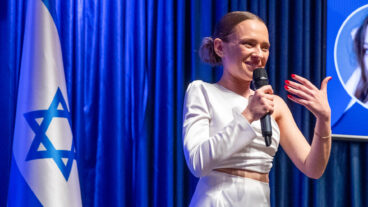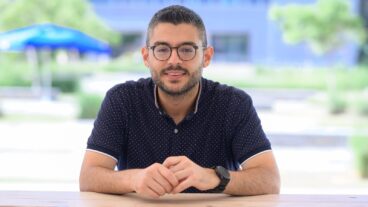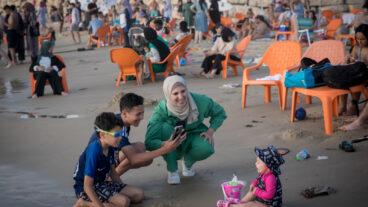‘I’m more than happy to represent the country I was born in,’ says Israeli Eurovision contestant Eddie Butler. ‘I love Jerusalem, I love Israel, I live for this country.’As he performs his soulful number at the upcoming Eurovision Song Contest in Athens on May 18, 34-year old Eddie Butler will not just be representing his country, but the unique community in which he grew up.
Butler may not look the part, but he is a native son of Israel – born in the Negev. Butler’s parents are Americans, and members of the Black Hebrews African-American community that believes they are a lost tribe of Israel. His mother and father came to Israel for a visit 37 years ago and decided to stay.
“I’m more than happy to represent the country I was born in. I love Jerusalem, I love Israel, I live for this country,” Butler told ISRAEL21c. “This is my home.”
It will be Butler’s second opportunity to represent Israel at the Eurovision Song Contest: Europe’s biggest pop music shindig with 38 nations competing for the best song. Butler represented Israel back in 1999 as part of a group, Eden, placing a respectable fifth.
This year’s contest is the opportunity he says he’s been waiting for and this time he hopes to reach the top spot.
“This time, I’ll be singing solo, and the stage is mine,” Butler says. “I did not serve in the IDF (Army) and now I have the opportunity to pay back the country which I love so much. I’m going out there and I’m going to do what I do best. I’m going to sing my song from the bottom of my heart.”
Butler’s entry, “Together We Are One”, is a pop ballad influenced by R&B and soul, which he is singing partly in English and partly in Hebrew.
“English is universal, and I wanted the chorus to ring in the audiences’ heads. ‘Together We Are One’ is talking about love. At first I wanted to write a spiritual song but then I said I’d rather not preach too much right now. When I wrote it, former prime minister Ariel Sharon had just had his stroke, there was uncertainty about Ehud Olmert, and Iran’s president was talking crazy. I just wanted to give the Israelis a concert they could enjoy, and later I’ll get my [spiritual] messages out.”
Having been marginalized for nearly four decades by the Israeli government, music has been a key element in earning the Black Hebrews’ acceptance in the State. From the time he was eight years old, Butler and his brothers toured the country singing for all those who would listen. They gave a face to the mysterious community not many Israelis knew existed.
The head of the Black Hebrews – or the African Hebrew Israelites of Jerusalem, as they call themselves – is Ben Ammi Ben Israel (whose name translates to ‘son of my people, son of Israel’), a former Chicago steelworker who came to Israel in the late 1960s. The group claims descent from the ancient Israelites, who they say, wandered through West Africa after the biblical expulsions.
Despite their claims of Jewish ancestry, the Black Hebrews had been denied citizenship and restricted to temporary-resident status for many years. Today, the community, numbering some 2,500 people, holds permanent residency, and encourages their young people to enlist in the army.
“A small community that had its origins in not being at all accepted as part of Israel, and now we’re representing Israel!” spokeswoman Yaffa Bat Gavriel told the Associated Press. “And that’s where we want to be. We want to show that we’re here to do our part for this country.”
Most of the community still resides in southern Israel. At the age of 19, Butler decided that he needed to be in Tel Aviv in order to succeed in music. He sang at a number of local venues before eventually joining forces up with his brother, Gabriel, and two Israelis who were not from the Black Hebrew community to form the band, Eden. The group broke up in 2001, and a year later, Butler embarked on a solo career.
Since then, he has performed throughout Europe, Russia and the US. In 2003, he represented Israel in Yurmala, Russia’s equivalent to the Eurovision Song Contest. He won the title of “audience favorite” and received an offer to stay in Russia and perform there. But he chose to return to Israel, which he repeatedly states is his “true home”. Married to an Israeli and a new father, Butler is now in the process of converting to Judaism.
Thanks to Shiri Maimon’s fourth place finish in last year’s Eurovision Song Contest, Butler was a direct qualifier to this year’s final in Athens (May 20).
“It makes me feel more confident that I know I’m in a good place. I don’t have to do all the rehearsals. We’re going to be there for a week, I’m going to relax for the first two or three days and then I’m going to work on what I got to do and just concentrate,” says Butler, describing his strategy going into the contest.
While Butler is Israel’s official representative, he’s not the only Israeli taking part in this year’s Eurovision. Liel Kolet, the teenage singing sensation who has performed duets with former US president Bill Clinton and U2’s Bono, is part of Switzerland’s multi-national group, Six4One.
As for Butler, he has his work cut out for him.
Currently, “Together We Are One” is not one of the favored songs, according to PaddyPower betting web site. Host country, Greece is favored 15-8 to take the trophy, with Sweden next in line at 5-1 and Romania at 6-1. Switzerland is placed at 50-1 odds, while Israel sits at betting odds of just 125-1 to win.
Still, as fans of the song contest know, upsets are standard when it comes to voting.
“I’m feeling good,” Butler said. “I know that in Europe they don’t have songs like this. I keep up with the charts, and listen to European music, and know there’s no soul there. They have good music coming from Europe but not in 2006. There’s no more Beatles, no Phil Collins, so I think we have a great chance. I’m going to give it my best.”












